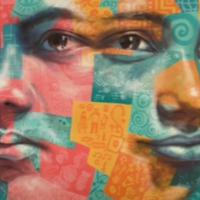
When my mum complained that things were hard, a friend suggested that she send a child to go and work for someone she knew. My mother’s friend said that I was old enough, I was 12 at the time and the eldest. I was sent to an aunt in a village in the east. I thought she was my aunt, but it turns out she wasn’t. This ‘aunt’ was supposed to send me to school, but instead I was made to work. I only had the clothes I arrived in to last me the whole six months I was there. Sometimes when I was on her good side, I would eat once or twice a day. If I was on her bad side then I would starve for two days. Even though I was eating very little, I was overworked. I was made to work more than anyone doing manual labour on her farm. I had to sleep on concrete. She wanted to pimp me out, but because I refused, she would beat me and stab me. I decided to run away. Every day, the aunt would wake me up at 3.30am, so I had to start running by 3.00am. I started running. I got to a church and a Catholic priest let me in. I was allowed to call my mother; I memorised her number before I left. Two days later, my mum arrived to collect me. I was away from home for six months. Because afterwards I needed medical treatment, I lost a year out of school.
Narrative provided by ICAI









